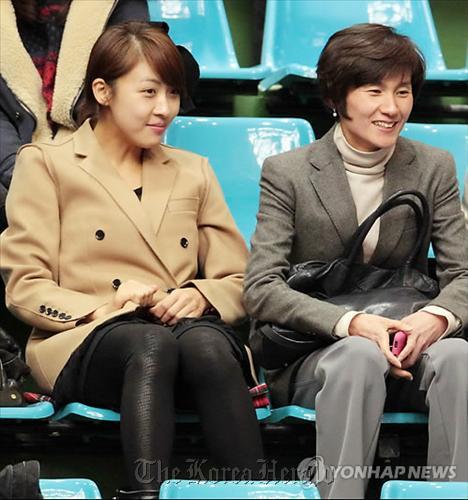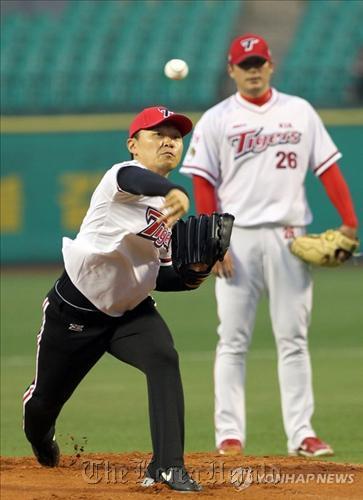A well-worn clich says sports is drama without a script. And one of the reasons people love sports is because its improvisational theater exposes a full range of human emotions, from the exuberant joy of victory to the excruciating pain of defeat.
This summer, South Korean moviegoers will be able to experience that roller-coaster ride from the comfort of their seats in air-conditioned multiplex theaters, instead of on sun-drenched bleachers at baseball parks or football stadiums.
At least half a dozen sports films are in production and could be released in the next couple of months, according to distributors and production companies.
The films will cover a wide range of sports, from baseball, the nation’s most popular sport, to more obscure sports such as marathon, boxing and table tennis. Some are based on true stories, while others rely on fictitious characters to deliver the drama.
Fictional or not, filmmakers say few subjects are as compelling as stories of athletes who overcome adversities.
“It’s not as though we were trying to do sports from the beginning,” said Cho Yun-mi, head of Lemon Tree, a Seoul-based film promotion company.
One of the films it’s promoting this year is “Fight,” a fictional tale about a former all-star pitcher who grows up only after getting demoted to the minor league.
“We were looking for some dramatic and touching characters, and we stumbled upon athletes,” Cho added. “The way they go through grueling practices and a series of failures before ultimately realizing success can be an apt metaphor for life.”
The summer lineup will also include “Pacemaker,” about a marathon pacesetter who tries to complete his first marathon.
“Champ” will tell the real-life story about a jockey and his limping racehorse as they try to compete in a Grand Prix event.
Two films based on true stories stand out among the pack.
“Korea” will center on the joint South Korea-North Korea women’s table tennis team that won the gold medal at the 1991 World Table Tennis Championships in Chiba City, Japan.
It was the first time the two Koreas had fielded a united team in any international sports competition. In the team final, the Korean athletes stunned China, which had won the previous eight titles in a row.
This summer, South Korean moviegoers will be able to experience that roller-coaster ride from the comfort of their seats in air-conditioned multiplex theaters, instead of on sun-drenched bleachers at baseball parks or football stadiums.
At least half a dozen sports films are in production and could be released in the next couple of months, according to distributors and production companies.
The films will cover a wide range of sports, from baseball, the nation’s most popular sport, to more obscure sports such as marathon, boxing and table tennis. Some are based on true stories, while others rely on fictitious characters to deliver the drama.
Fictional or not, filmmakers say few subjects are as compelling as stories of athletes who overcome adversities.
“It’s not as though we were trying to do sports from the beginning,” said Cho Yun-mi, head of Lemon Tree, a Seoul-based film promotion company.
One of the films it’s promoting this year is “Fight,” a fictional tale about a former all-star pitcher who grows up only after getting demoted to the minor league.
“We were looking for some dramatic and touching characters, and we stumbled upon athletes,” Cho added. “The way they go through grueling practices and a series of failures before ultimately realizing success can be an apt metaphor for life.”
The summer lineup will also include “Pacemaker,” about a marathon pacesetter who tries to complete his first marathon.
“Champ” will tell the real-life story about a jockey and his limping racehorse as they try to compete in a Grand Prix event.
Two films based on true stories stand out among the pack.
“Korea” will center on the joint South Korea-North Korea women’s table tennis team that won the gold medal at the 1991 World Table Tennis Championships in Chiba City, Japan.
It was the first time the two Koreas had fielded a united team in any international sports competition. In the team final, the Korean athletes stunned China, which had won the previous eight titles in a row.

Ha Ji-won, a multiple award-winning star of blockbuster films, has been cast as Hyun Jung-hwa, the top South Korean player at the championships and an Olympic gold medalist. Bae Doo-na, another veteran, will be Li Bun-hui, the North Korean star and Hyun’s doubles partner in Chiba City.
Hyun, a former national team coach and now an executive with the Korea Table Tennis Association, has been teaching Ha and other members of the cast since the start of the year.
“The Perfect Game” is a baseball flick about two of the country’s greatest pitchers, culminating with their thrilling duel more than two decades ago.
On May 16, 1987, Sun Dong-yol of the Haitai Tigers and Choi Dong-won of the Lotte Giants met for the third and the final time in their illustrious careers in the Korea Baseball Organization. Each right-hander went the distance as their teams ended in a 2-2 tie after 15 innings in one of the most memorable games in the league’s 29-year history.
Sun is largely regarded as the finest pitcher the KBO has seen.
In 11 seasons split as a starter and a closer, He went 146-40 with 132 saves and a 1.20 earned run average on his way to winning three most valuable player awards, which helped the Tigers win six Korean Series championships.
Choi, a fireballer whose career was cut short by injuries, is best known for winning all four games himself in the 1984 Korean Series. He remains the only KBO pitcher to win all four games in the best-of-seven championship series. Choi still holds the record for most strikeouts in a season with 223.
Director Park Hee-gon said two stars of the film, Cho Seung-woo as Choi and Yang Dong-geun as Sun, have been training with a former national team baseball pitcher.

Park said the actors have done a fine job depicting pitchers, but added baseball action is only part of the story. The director said it doesn’t follow the “loser-makes-good” storyline of clichd sports flicks.
“The film is about the fierce jealousy of the two men who had accomplished pretty much all except for one thing,” Park said. “And it started with the question, ‘What if the other man had that one missing piece?’”
Park said he chose to focus more on the human element than on actual athletics. That way, he may be following in the footsteps of recent hit sports films.
“The National Team,” a 2009 film about Korean ski jumpers, is one of the highest-grossing local films of all time. Experts credit the film with helping the recent emergence of sports movies.
Other hits include “Forever the Moment” from 2008, a true story about the South Korean women’s handball team at the 2004 Athens Olympics, and “Mr. Gam’s Victory” from 2004, a true-life tale about a mop-up bullpen pitcher, Gam Sa-yong, thrown into a starting role against the KBO’s best team in 1982.
All three are as much about human drama as sporting competitions, with underdogs trying to fight their way into relevance. None of them ends on a victorious note ― a ski jumper botches his landing, South Korea loses to Denmark in the handball final and Gam gives up a walk-off home run ― but that didn’t keep moviegoers from filling the seats.
Jeong Seung-chul, a 37-year-old enthusiast of both sports and films, said he had become tired of predictable endings in some earlier sports movies but that he enjoyed the three films.
“After a while, you can grow bored of seeing good guys always win,” he said. “I think it’s more dramatic when those good guys don’t end up winning but still take away something meaningful from their defeats. That’s probably a more realistic metaphor for life because you don’t always win in life.”
Sometimes, financial issues can force filmmakers to opt for the drama over the action. They say it’s virtually impossible to project the thrills of real-life competitions onto the big screen.
Choi Min-soo of CJ E&M, the distributor for “Korea,” said there’s only so much cameras and high-tech equipment can do.
“If you want to shoot sports scenes and make them realistic, it will cost more than twice as much as shooting a normal film,” he said. “This is why sports films can be risky.”
Risky or not, filmmakers have tried to jump on the bandwagon.
With three all-sports cable stations and three golf channels providing blanket coverage, and a record number of fans going to stadiums across the country, the time has hardly been riper for sports movies.
(Yonhap News)







![[Graphic News] More Koreans say they plan long-distance trips this year](http://res.heraldm.com/phpwas/restmb_idxmake.php?idx=644&simg=/content/image/2024/04/17/20240417050828_0.gif&u=)
![[KH Explains] Hyundai's full hybrid edge to pay off amid slow transition to pure EVs](http://res.heraldm.com/phpwas/restmb_idxmake.php?idx=644&simg=/content/image/2024/04/18/20240418050645_0.jpg&u=20240419100350)





![[From the Scene] Monks, Buddhists hail return of remains of Buddhas](http://res.heraldm.com/phpwas/restmb_idxmake.php?idx=652&simg=/content/image/2024/04/19/20240419050617_0.jpg&u=20240419175937)

![[KH Explains] Hyundai's full hybrid edge to pay off amid slow transition to pure EVs](http://res.heraldm.com/phpwas/restmb_idxmake.php?idx=652&simg=/content/image/2024/04/18/20240418050645_0.jpg&u=20240419100350)

![[Today’s K-pop] Illit drops debut single remix](http://res.heraldm.com/phpwas/restmb_idxmake.php?idx=642&simg=/content/image/2024/04/19/20240419050612_0.jpg&u=)